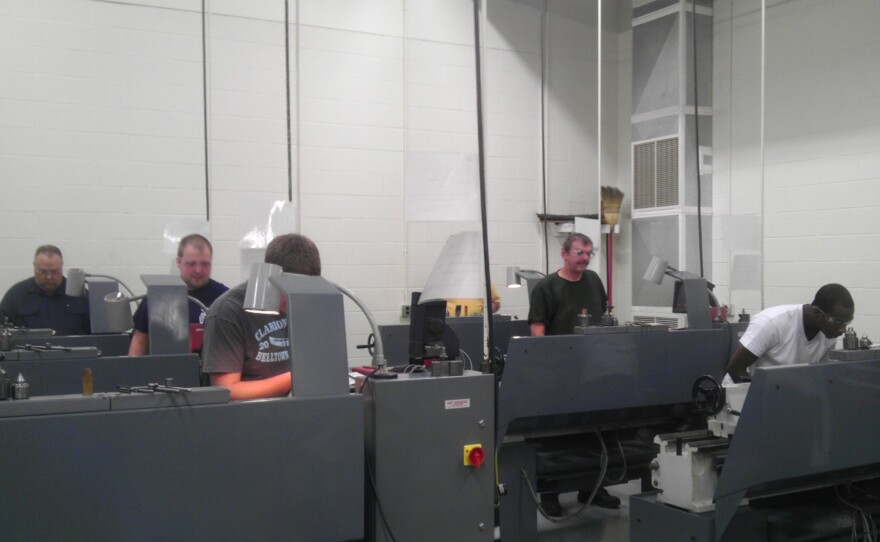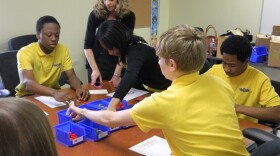Last year the US Department of Labor awarded more than $14-million to the SUNY network of community colleges in upstate New York to develop work training programs for emerging industries. But, nearly one year on, the advanced manufacturing sector is asking for more pointing to the skills gap as an ongoing issue.
Eric Roth is one of fifteen students in the commencing class of an intensive course aimed at combating the growing thirst for workers.
The course being run at the Monroe Community College (MCC) in Western New York aims to double the graduation rate in a year without diluting course content.
“It is very intense, I have a wife and two kids at home, another one coming, and it’s been hectic,” says Roth.
And the course is pretty full on. It’s 30 hours a week split into five, six hour sessions that run until 10 at night.
Manufacturing has evolved
Roth’s already got a bachelor’s degree in history and a master’s degree in public administration. But, like many graduates these days, he bounced around the job market in the service industry and other areas trying to find a good fit.
He says the availability of jobs in advanced manufacturing and the realization that the industry has evolved are what drew him to this course.
“There do seem to be an increase of jobs in this area, and also it isn’t what we call here a bunch of ‘button pushers’. It requires physical as well as mental skills.”
MCC was one of 30 SUNY schools to receive funding.
They currently have a one and a two year program re-skilling displaced workers and military veterans and funneling them into the advanced manufacturing field, but, it still isn’t filling the regional skills gap.
“That’s not enough to meet the demand of employers,” says Kevin Kelley, executive director of the Rochester Technology and Manufacturing Association (RTMA), a partner in developing the intensive program.
“So this program emerged, this is the one year program but it’s accelerated. So therefore, it’s going to provide more candidates with the requisite skill sets.”
Veteran looking for stability
The new course started this month. It’s an intensive six month program and it’s attracted people for a variety of reasons.
“For me it’s just peace of mind, I mean because you never know. In my previous profession when I would go into work I didn’t know if I was going to have a job the next day or not. I’m just tired of moving to be honest with you,” says Jim Alderman, a veteran.
Alderman spent years doing contract work for the military and he says all he wants now is a stable job. He’s lived all over the world from army bases around the US to Thailand, Japan, and the list goes on…
“I was in Panama during the war in Panama, fixing bullet holes in Black Hawks and fun things like that, and I spent almost five years in Germany working on all of the airplanes flying to Bosnia during the war.”
In his down-time, Alderman is an avid sewer. While he wouldn’t be able to make his own sewing machine at the end of the six months of training, he’s pretty confident he’d be able to fix one.
Apart from that, like his other class mates, he’ll have the prospect of a stable job.
Program director Ross Micali says the students are getting hands on training that will have an impact on both them, and the industry.
“I think what they’re seeing is they’re seeing the importance of it, they’re seeing that at the end of the six months they’re going to be very employable.”
While skills shortages in the advanced manufacturing industry have been generally acknowledged, estimates of the size and severity of that shortage tend to vary widely.
Industry members claim there are approximately 600,000 unfilled jobs nationwide, while a study by the Boston Consulting Group puts the number between 80 and 100,000.
RTMA’s Kevin Kelley says the problem needs to be addressed in high schools as well as community colleges.
“The ideal scene would be to have candidates emerge for secondary schools where there are applied technology programs available to the students.”
Kelley says not all students will want to go down the advanced manufacturing path in high school, but he says the ones who do should have that choice.
With rising debt levels for college students and a tougher job market, Kelley says training for an industry that has vacant jobs while in high school would be a good option for some.







